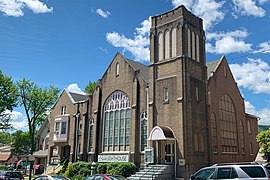
St. Stanislaus Institute, also known as St. Stanislaus Orphanage and Holy Child Church, is a historic former Roman Catholic orphanage complex located at 141 Old Newport Street in Newport Township, Luzerne County, Pennsylvania within the Diocese of Scranton.
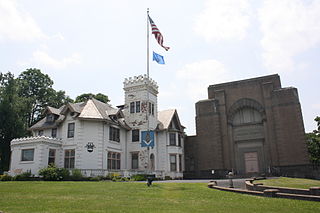
Fountain Hill Historic District is a national historic district located at Bethlehem, Lehigh County and Northampton County, Pennsylvania. Despite the name, it is mostly excludes the borough of Fountain Hill, which is an independent municipality located mostly to the southwest of the district.

The Tyrone Borough Historic District is a national historic district that is located in Tyrone, Blair County, Pennsylvania.

The Woodvale Historic District is a national historic district that encompasses multiple historic properties that are located in Broad Top Township, Bedford County, Wells Township, Fulton County, and Wood Township, Huntingdon County, Pennsylvania.

Cambria City Historic District is a national historic district located at Johnstown in Cambria County, Pennsylvania. The district includes 198 contributing buildings and 1 contributing structure in a predominantly working-class residential area of Johnstown. Though predominantly residential, it also includes a small business district and industrial buildings such as a former brewery, bottling plant, and slaughter house, along with a notable collection of churches, schools, and fire station. The district includes some buildings dated before the Johnstown Flood, but the majority date from 1890 to 1920. Notable buildings include the collection of two-story, balloon frame, detached and semi-detached dwellings, Fifth Avenue Hotel (1889), Pollack Building (1905), former Cambria Fire Hose and Ladder Company (1890), former Germana Brewery (1907), August and Louisa Mayer Building (1907), Tulip Bottling Company (1913-1949), St. Casimer's Polish Church (1907), Immaculate Conception Church (1908), St. Stephen's Slovak Church (1914), St. Columba Church (1914), St. Mary's Greek Catholic Church (1922), Venue Of Merging Arts, Hungarian Reformed Church (1902), and First Catholic Slovak Band Hall (1913-1949). The contributing structure is the Minersville Bridge (1914).
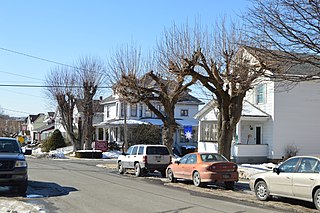
The Portage Historic District is a national historic district that is located in Portage in Cambria County, Pennsylvania.
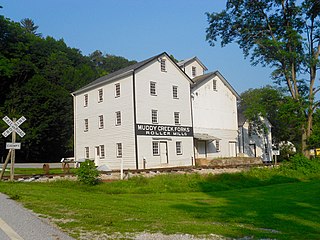
The Muddy Creek Forks Historic District is a national historic district that is located in the Village of Muddy Creek Forks in East Hopewell, Fawn, and Lower Chanceford Townships in York County, Pennsylvania.

The Hanover Historic District is a national historic district located in Hanover in York County, Pennsylvania. Bordered roughly by Elm Avenue, Broadway, Eisenhower Drive, Hollywood Avenue, and the borough's boundary line, this district encompasses 2,632 contributing buildings, four contributing sites, three contributing structures, and one contributing object in the central business district and surrounding residential area of Hanover.

The North Scranton Junior High School is a historic American junior high school building located at Scranton, Lackawanna County, Pennsylvania.

The Newville Historic District is a national historic district which is located in Newville, Cumberland County, Pennsylvania. The district is bordered roughly by Cove Alley, Big Spring Creek, the right-of-way for the Cumberland Valley Railroad, and Washington Street, and encompasses 414 contributing buildings, one contributing site, and two contributing objects in the central business district and surrounding residential areas of Newville.

The Rodale Organic Gardening Experimental Farm, also known as the Working Tree Center, is a historic home and farm located in Lynn Township, Pennsylvania. It is important in the history of organic gardening and farming in the 20th century.
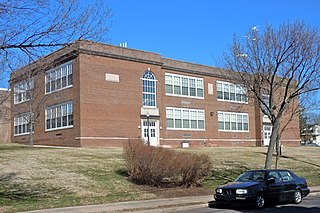
The Jefferson Elementary School is an historic American school building that is located in Pottstown, Montgomery County, Pennsylvania.

The Milanville Historic District, is a national historic district that is located in Damascus Township, Wayne County, Pennsylvania.

Historic Fairview Park, Assoc. is a historic African American spiritual retreat center and recreational destination located at Salem Township, Westmoreland County, Pennsylvania. It was developed during the Jim Crow era. Contributing resources include the landscape, ballfield, and a late-19th - early-20th century frame barn.
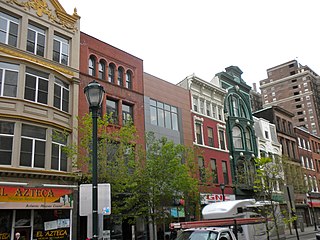
The East Center City Commercial Historic District is a national historic district located in the Washington Square neighborhood of Philadelphia, Pennsylvania. It encompasses 287 contributing structures, including large and small commercial buildings, banks, hotels, newspapers, clubs, and restaurants.

The Plaza Apartments, also known as Vernon House, is an historic, American apartment complex that is located in the Strawberry Mansion neighborhood of Philadelphia, Pennsylvania.

The Philadelphia, Wilmington and Baltimore Railroad Freight Shed is an historic freight station in the Southwest Center City neighborhood of Philadelphia, Pennsylvania, along Broad Street. It was added to the National Register of Historic Places in 2011 and is today part of the Lincoln Square mixed-use development.

Queen Anne Historic District is a national historic district located in Reading, Berks County, Pennsylvania. The district encompasses 2,405 contributing buildings in Reading built between about 1880 and 1925. The district consists primarily of semi-detached houses and rowhouses, with a few stone church buildings and small commercial buildings. Most of the buildings are constructed of brick and reflective of Late Victorian and early 20th-century architectural styles. The churches are St. Mary's Episcopal Church (1904) and Wesley United Methodist Church (1922). Located in the district and separately listed are the Charles S. Foos Elementary School and former Meinig Glove Factory-E. Richard Meinig Co.

Harlan Courthouse Square Commercial District is a nationally recognized historic district located in Harlan, Iowa, United States. It was listed on the National Register of Historic Places in 1994. At the time of its nomination the district consisted of 54 resources, including 38 contributing buildings, one contributing site, one contributing object, 13 noncontributing buildings, and one noncontributing object. Cross-shaped in plan, the historic district covers most of the city's central business district in the original town plat. Most of the buildings are two-story, brick, commercial buildings. Commercial Italianate and Queen Anne styles are dominant. The Shelby County Courthouse (1893) is a stone Richardsonian Romanesque structure. The courthouse square block and the four surrounding half blocks and rear alleys constitute the contributing site. The Soldier's Monument on the square is the contributing object, and the POW/MIA Monument is the noncontributing object because of its more recent construction.
North Grand Avenue Residential Historic District is a nationally recognized historic district located in Spencer, Iowa, United States. It was listed on the National Register of Historic Places in 2014. At the time of its nomination the district consisted of 118 resources, including 96 contributing buildings, one contributing structure, 12 noncontributing buildings, and two noncontributing structures. The district is an 11 block area north of the city's central business district. North Grand is a tree-lined street divided by a landscaped boulevard, and features Art Deco light fixtures. Its design was influenced by the City Beautiful movement. The thoroughfare carries U.S. Route 71/18 traffic. The contributing buildings are houses, garages, and four churches. Architectural styles found here are Queen Anne, Victorian, Classical Revival, Colonial Revival, Greek Revival, American Four Square, Tudor Revival, Bungalow, and American Craftsman. Many of the buildings are architect designed. One of the houses in the district, the Adams-Higgins House, was individually listed on the National Register in 1984.






